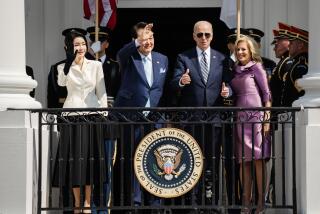The free-trade fight
The wide differences between Republicans and Democrats on economic policy don’t leave much room for compromise over the next two years. But Tuesday’s takeover of the House of Representatives by the GOP raises hopes for progress on at least one important initiative: It might help President Obama win approval of a U.S.- South Korea free-trade pact.
President George W. Bush was a big proponent of the bilateral agreement with South Korea, which both governments signed in 2007, but he couldn’t persuade Congress to approve it. Obama seems an unlikely champion, especially since he criticized the deal during his 2008 presidential campaign. But rather than kill the pact, he’s working to renegotiate it. In June, Obama promised South Korean President Lee Myung-bak that he would revive the stalled trade talks in hopes of producing a mutually agreeable deal by Nov. 11, when Obama will travel to Seoul for the G-20 economic summit.
Obama evidently hopes to appease U.S. automakers who think the existing pact does too little to open the South Korean market to American cars, and ranchers who fret about South Korean restrictions on beef imports. Tweaking the pact to accommodate them shouldn’t pose an excessive challenge, but it’s improbable that U.S. labor unions will ever support the deal — and where organized labor leads, the Democratic Party tends to follow. Union fears that lower trade barriers will prompt a loss of American jobs not only ignore the job growth that can be expected as South Korean consumers buy more American products, but the positive (and job-producing) economic impacts of lower prices for South Korean goods in the United States. According to the U.S. International Trade Commission, the pact would boost U.S. gross domestic product by up to $12 billion a year.
What’s more, failing to approve the deal would put the U.S. at a serious disadvantage to the European Union, which signed its own bilateral trade pact with South Korea last month. South Korean trade also threatens to shift increasingly toward China.
It’s questionable whether Obama will have the political courage to upset the Democrats’ political base by seriously pushing for the trade deal. Also unknown is whether the freshman class of “tea party”-backed Republicans will be as gung-ho for free trade as GOP stalwarts have been. But if only Richard Nixon could go to China, it may be that only Obama, with his labor credentials, could get away with opening our markets to South Korea. And a GOP-controlled House may give him a welcome opportunity to do it.
More to Read
Get the L.A. Times Politics newsletter
Deeply reported insights into legislation, politics and policy from Sacramento, Washington and beyond. In your inbox three times per week.
You may occasionally receive promotional content from the Los Angeles Times.









